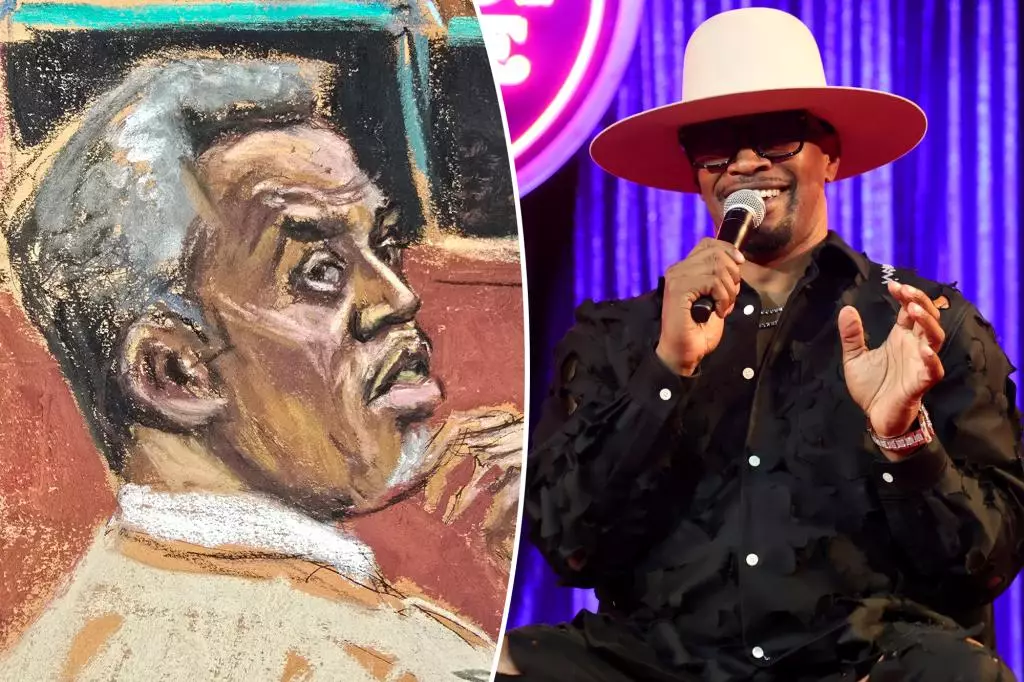In an electric performance at The Comedy Store in West Hollywood, acclaimed actor and comedian Jamie Foxx took it upon himself to tackle the uncomfortable topic of Sean “Diddy” Combs and the recent harrowing allegations that have surfaced against the music mogul. With unfiltered humor, Foxx didn’t shy away from the weight of the situation, saying, “That Diddy s–t crazy, huh?” This seemingly playful quip masks deeper questions about accountability and the impact of celebrity culture on societal norms, particularly within the Black community.
Foxx’s approach highlights the dual-edged sword of humor, one that serves both as entertainment and as a critique. By expressing both shock and disgust at Diddy’s alleged actions—a series of testimonies that portray the rap mogul in a deeply troubling light—Foxx tapped into the collective anxiety felt by many about the collapse of a figure who was once revered. His statements reflect a broader sentiment in which the idolization of public figures can quickly morph into disillusionment when their true behaviors come to light.
The Shift in Perception
The dynamics of public perception can be astonishingly volatile. Foxx laments the tarnishing of Diddy’s legacy, stating, “For the Black people in here, you know how that hurts us.” It’s a stark reminder of how cultural icons can address and influence values within the community. Diddy represented a narrative of success and ambition—“It’s all about the Benjamins”—but as Foxx pointedly puts it, the new whisper in the wind seems to be about “baby oil,” marking a significant departure from the icons’ previously celebrated contributions to hip-hop culture.
The contrast Foxx draws between Diddy’s former heroic status and current allegations of lewdness serves as a poignant commentary on the disillusionment felt by fans and community members alike. When a cultural touchstone embarks on a path marred by illegal and immoral conduct, it shakes the foundations of collective identity and community pride, where figures like Diddy were once champions of cultural elevation.
Humor as a Shield and a Weapon
During his candid set, Foxx did not just unleash a string of jokes; he utilized comedy as a vehicle to confront uncomfortable realities. Acknowledging the severity of Diddy’s trial—racketeering conspiracy, sex trafficking, and other serious charges—Foxx’s humor serves both as a defense mechanism and a form of exposure. By addressing the allegations head-on, he challenges his audience to confront the disturbing truth while simultaneously offering a release through laughter.
His phrasing, evoking old catchphrases like “Take that, take that,” with new implications, illustrates the uncanny ability of language to evolve meanings based on context. By twisting these familiar phrases into something sinister, Foxx forces his audience to reassess not only their past admiration for Diddy but also the complexities embedded within fandom and celebrity culture.
A Broader Conversation on Accountability
As Foxx continued to voice his disbelief over the scandal, he unwittingly initiated a broader ongoing conversation about accountability in the realm of fame and fortune. Celebrity culture often comes hand-in-hand with unchecked power, and as Diddy’s alleged actions illustrate, this can lead to horrific abuses. The speed with which Foxx turns the focus back on Diddy elucidates the heavy burden that public figures carry; they are not merely entertainers but are often seen as moral barometers for the communities they represent.
Foxx’s remarks bring to the forefront the question of how individuals and society at large reconcile the duality of human nature: the ability to admire yet also critique. In an age where the lines between personal and public lives blur, the need for transparency and integrity has never been more pressing. Foxx, through his performance, became a catalyst for reflection, urging fans to re-examine their relationship with celebrity while holding those in power accountable for their actions.
This pivotal moment at The Comedy Store ultimately reveals the intricate layers of public perception and responsibility, proving that sometimes, the most potent insights come wrapped in humor, shattering the comfortable façade of celebrity idolization.

